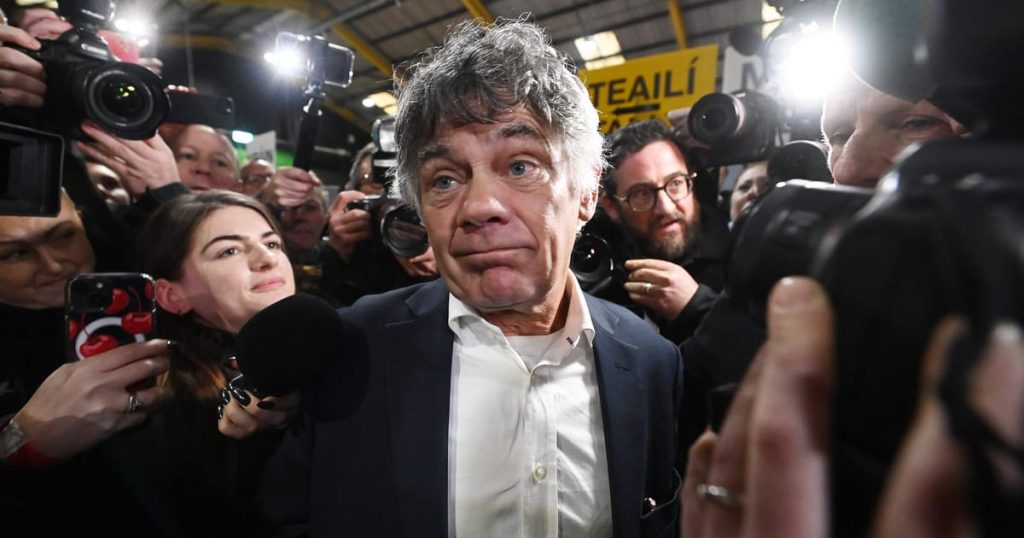In a surprising turn of events during the recent Irish elections, voters in Dublin Central rejected the unexpected candidacy of notorious gangland figure Gerry “The Monk” Hutch, who had launched a campaign from Spain while facing serious legal challenges. Hutch, recently acquitted of murder charges associated with a violent criminal feud, aimed to secure a parliamentary seat in a highly competitive election featuring prominent political figures, including Mary Lou McDonald, the Sinn Féin opposition leader, and Paschal Donohoe, a senior member of the ruling Fine Gael party. Despite the prevailing sentiment that his campaign would have little impact, Hutch garnered significant attention as the election unfolded, revealing the complexities of Ireland’s proportional representation electoral system that allows voters to rank candidates by preference.
The election counting process was closely watched across the nation, filled with anticipation and apprehension as Hutch initially secured a surprising number of first-preference votes, placing him fourth among a crowded field of candidates. His early success ignited a mix of horror among political analysts and excitement among anti-establishment supporters who viewed his candidacy as emblematic of a broader discontent with the political elite. As Hutch’s vote count increased over several rounds of transfers from eliminated candidates, observers within the Royal Dublin Society hall were left stunned, given Hutch’s criminal background and the nature of his campaign, which primarily relied on social media platforms like TikTok.
As the counting progressed, Hutch benefitted from surplus votes from McDonald, the first candidate declared a winner, and also gained support from voters of other losing candidates, including Clare Daly. With his vote total climbing and seemingly within reach of the last available seat, it appeared that Hutch’s improbable quest might succeed. However, his fortune soon shifted dramatically as transfers from voters for candidates from the ruling government parties, notably the Greens and Fianna Fáil, increasingly favored his closest rival, Marie Sherlock of the Labour Party. Just as Hutch was poised for victory, the final rounds highlighted the volatility of the electoral process and the unpredictable outcomes it can yield.
The culmination of the counting process provided a tense narrative as Fine Gael’s Donohoe contributed to Sherlock’s final surge, relegating Hutch’s aspirations to uncertainty. In a moment charged with tension, Hutch, still grappling with threats from his criminal past, made his last public appearance at the count center, navigating through a throng of media seeking interviews. Displaying surprising humor, he speculated on future political ambitions, including a potential presidential run. However, the mood soon shifted as he received news of his narrow defeat to Sherlock, which ultimately reflected a broader societal sentiment for change amid rising economic pressures.
Sherlock’s eventual victory, with a total of 6,102 votes against Hutch’s 5,321, resonated with many who had felt politically disenfranchised. The satisfaction felt by her supporters underscored the political landscape’s shifting dynamics, where even candidates with controversial backgrounds could attempt to capitalize on discontent with traditional politics. For Sherlock, the electoral results were a stark indication of the existing challenges faced by ordinary citizens, emphasizing how the country’s growing wealth was not translating into improved living conditions for all. Her emotional response upon hearing the results highlighted the significance of this election as not just a political contest, but as a reflection of broader societal frustrations.
Ultimately, the election showcased the unpredictable nature of Ireland’s political climate, where traditional power dynamics can shift unexpectedly due to public sentiment and dissatisfaction with the status quo. Hutch’s near-victory serves as a case study highlighting the potential for fringe candidates to leverage public displeasure, even amidst significant scrutiny of their backgrounds. As Ireland grapples with pressing issues such as housing shortages and rising living costs, the outpouring of voices for change suggests a potential reshaping of its political landscape. The election results propelled Sherlock into a position to address these long-standing issues, suggesting that regardless of individual narratives, the collective desire for a more equitable and responsive governance remains at the forefront of Irish political discourse.














